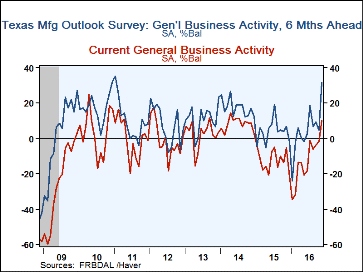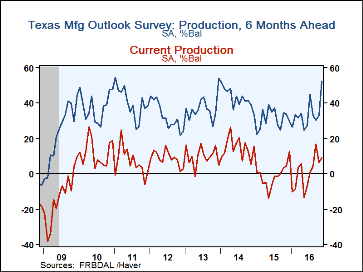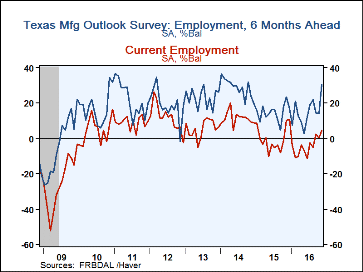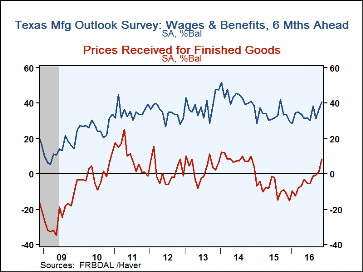 Global| Nov 28 2016
Global| Nov 28 2016Texas Factory Sector Activity Strengthens
by:Tom Moeller
|in:Economy in Brief
Summary
The Federal Reserve Bank of Dallas indicated in its Texas Manufacturing Outlook Survey that the General Business Activity index jumped to 10.2 during November, following negative readings extending back to December 2015. The worst of [...]
The Federal Reserve Bank of Dallas indicated in its Texas Manufacturing Outlook Survey that the General Business Activity index jumped to 10.2 during November, following negative readings extending back to December 2015. The worst of those indications occurred this past January at -34.6. The production figure of 8.8 was higher than -13.1 six months ago. The growth rate of new orders also improved to -0.8, up from -17.5 in January. Hiring activity has been strengthening. The latest reading of 4.5 compared to a June low of -11.5. The workweek reading rose to 2.5 versus a low of -12.8, also in June. Growth in wages & benefits also improved with the index reading at 18.4 against a July low of 10.5. Shipments deteriorated, however, as indicated by a negative 1.9 versus a June high of 20.1. Pricing power has been steadily improving. With the prices received reading at 8.0, it was up versus a low of -15.5 in December. Raw materials pricing similarly jumped. All of the figures are seasonally adjusted.
Optimism about future conditions was apparent throughout the report. The index of future business activity jumped to 31.6, its highest level since January 2011. The future production series similarly surged to 52.3, up sharply versus a January 2015 low. Expected orders and shipments growth surged as well. The employment reading doubled m/m to 30.6, its highest point since October 2014. The index of expected wages & benefits to be paid in six months similarly strengthened to the highest level since the middle of last year.
Each index is calculated by subtracting the percentage reporting a decrease from the percentage reporting an increase. When all firms report that activity has increased, an index will register 100. An index will register -100 when all firms report a decrease. An index will be zero when the number of firms reporting an increase or decrease is equal. Items may not add up to 100% because of rounding. Data for the Texas Manufacturing Outlook can be found in Haver's SURVEYS database.
The Minutes of the latest FOMC meeting can be found here.
| Texas Manufacturing Outlook Survey (SA, % Balance) | Nov | Oct | Sep | Nov'15 | 2015 | 2014 | 2013 |
|---|---|---|---|---|---|---|---|
| Current General Business Activity Index | 10.2 | -1.5 | -3.7 | -5.4 | -12.5 | 8.3 | 2.2 |
| Production | 8.8 | 6.7 | 16.7 | 4.4 | -1.0 | 14.5 | 9.8 |
| Growth Rate of Orders | -0.8 | -5.1 | -5.8 | -6.6 | -11.8 | 4.7 | 0.1 |
| Number of Employees | 4.5 | 0.2 | 2.3 | 10.0 | -0.4 | 11.5 | 5.6 |
| Prices Received for Finished Goods | 8.0 | 1.2 | -0.9 | -11.3 | -8.5 | 8.3 | 2.9 |
| General Business Activity Index Expected in Six Months | 31.6 | 4.8 | 9.3 | 7.0 | 4.1 | 17.4 | 11.0 |
| Production | 52.3 | 33.0 | 30.5 | 33.7 | 31.1 | 42.7 | 37.1 |
| Growth Rate of New Orders | 42.4 | 23.5 | 19.1 | 24.5 | 20.7 | 31.5 | 25.0 |
| Wages & Benefits | 40.4 | 36.4 | 31.2 | 33.6 | 33.2 | 43.1 | 38.2 |
Tom Moeller
AuthorMore in Author Profile »Prior to joining Haver Analytics in 2000, Mr. Moeller worked as the Economist at Chancellor Capital Management from 1985 to 1999. There, he developed comprehensive economic forecasts and interpreted economic data for equity and fixed income portfolio managers. Also at Chancellor, Mr. Moeller worked as an equity analyst and was responsible for researching and rating companies in the economically sensitive automobile and housing industries for investment in Chancellor’s equity portfolio. Prior to joining Chancellor, Mr. Moeller was an Economist at Citibank from 1979 to 1984. He also analyzed pricing behavior in the metals industry for the Council on Wage and Price Stability in Washington, D.C. In 1999, Mr. Moeller received the award for most accurate forecast from the Forecasters' Club of New York. From 1990 to 1992 he was President of the New York Association for Business Economists. Mr. Moeller earned an M.B.A. in Finance from Fordham University, where he graduated in 1987. He holds a Bachelor of Arts in Economics from George Washington University.
More Economy in Brief
 Global| Feb 05 2026
Global| Feb 05 2026Charts of the Week: Balanced Policy, Resilient Data and AI Narratives
by:Andrew Cates










